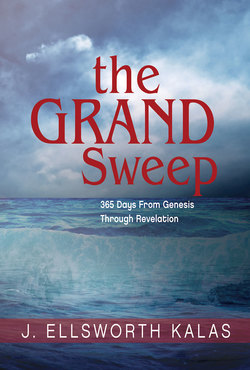Читать книгу The Grand Sweep - Large Print - J. Ellsworth Kalas - Страница 10
На сайте Литреса книга снята с продажи.
Оглавление| GENESIS 5–6; PSALM 7 | Week 1, Day 4 |
There’s much to be learned from reading an obituary column, chief of which is that we will all die. That, as Samuel Johnson would say, concentrates the attention. Genesis 5 is the first obituary column; its brief biographies are identical in their endings: and he died.
All but one. Enoch is a different sort of human being. In a setting of dying, he insisted on living, by means of his extraordinary communion with God.
Genesis 6 is an obituary column of another kind. It portrays a dead society. The smell of destruction is all about it, in proportions so ugly that “every inclination of the thoughts of their hearts was only evil continually,” until at last “the LORD was sorry that he had made humankind.”
But here, too, there was an element of wondrous life, in the man named Noah. He “found favor in the sight of the LORD,” for with evil all around him, he was “blameless in his generation.” Further, he managed to communicate his goodness to his family, so that his wife, his sons, and his daughters-in-law accepted his spiritual leadership.
No one else did, however. Though a New Testament writer calls Noah a “herald of righteousness” (2 Peter 2:5), his message was not heeded. Perhaps it was achievement enough to be good and godly in a thoroughly perverse time, even to the point of winning his own household.
PRAYER: Grant me, dear Savior, the grace to be a child of life, no matter how great the measure of death around me. Amen.
List several phrases from Genesis 6 that describe the degree of evil that characterized Noah’s time.
